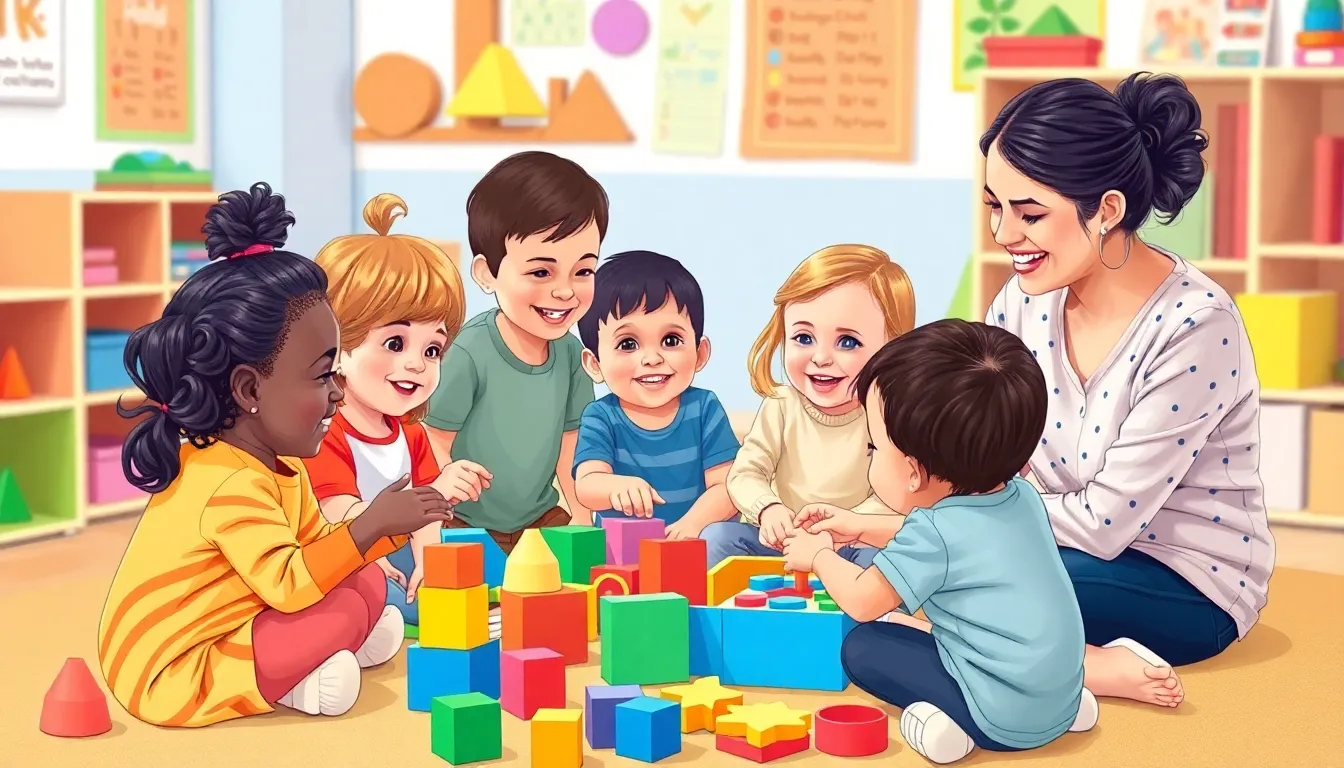In a world where toddlers can operate tablets better than some adults, early childhood education has never been more crucial. It’s not just about coloring inside the lines anymore; it’s about laying the foundation for lifelong learning. Today’s classrooms are buzzing hubs of creativity and curiosity, where little minds are nurtured to think big and explore boldly.
But wait—don’t let the thought of finger paint and nap times fool you. Early childhood education is a serious business, shaping the leaders of tomorrow. As parents and educators dive into this vibrant landscape, they discover innovative teaching methods that make learning as fun as a game of hide-and-seek. So, buckle up and get ready to explore how early childhood education is evolving and why it matters more than ever.
Table of Contents
ToggleOverview of Early Childhood Education Today
Early childhood education plays a crucial role in a child’s development in today’s fast-paced, technology-driven environment. This vital educational stage focuses on nurturing young children’s creativity and curiosity, which are essential for lifelong learning. Programs incorporate innovative teaching methods that encourage engagement and active participation.
Research reveals that quality early education significantly impacts children’s future success. Statistics show that students who attend high-quality preschool programs often excel academically and socially later in life. Educators prioritize holistic development by integrating social, emotional, cognitive, and physical learning experiences.
Technology integration in classrooms enhances learning opportunities, allowing children to explore and interact with educational content. Tablets and educational software can complement traditional teaching methods, facilitating personalized learning experiences. Educators use these tools not only to engage students but also to track their progress.
Curricula focus on hands-on activities that promote critical thinking and problem-solving skills. Play-based learning environments enable children to explore concepts through play, fostering collaboration and communication. Diverse learning experiences prepare them for future challenges in a constantly evolving world.
Parents and communities recognize the significance of early childhood education. Increased awareness translates to higher enrollment rates in early education programs, emphasizing a collective commitment to shaping future leaders. In this landscape, educators adapt to the changing needs of children, making early childhood education more relevant than ever before.
Importance of Early Childhood Education

Early childhood education plays a vital role in shaping children’s futures. It sets the groundwork for essential skills needed later in life.
Cognitive Development
Cognitive development flourishes in an engaging early education environment. Children learn problem-solving through play-based activities that stimulate curiosity. Research shows that quality education in these formative years leads to better academic outcomes. They develop critical thinking skills as they explore concepts through hands-on experiences. Moreover, children often gain confidence in their abilities, allowing them to tackle challenges independently. Early experiences with numbers, letters, and shapes build a strong foundation for future learning. Cognitive skills developed in these years translate into higher achievement in later grades.
Social Skills Development
Social skills development occurs through interaction in early childhood education settings. Children engage with peers, learning to communicate their thoughts and feelings. They practice sharing, cooperation, and empathy, essential skills for working in teams. As they navigate social situations, they develop conflict resolution skills. Observing and mimicking positive interactions also aids in reinforcing appropriate behaviors. Research indicates that children who attend quality early education programs show improved social competence. Stronger social skills lead to better relationships with peers and adults, ultimately fostering healthy emotional development.
Trends in Early Childhood Education
Early childhood education continuously evolves, reflecting current societal and technological changes. Integrating modern methods significantly enhances children’s learning experiences.
Technology Integration
Technology integration in early learning focuses on enhancing engagement and interaction. Children utilize tablets, interactive games, and educational applications to develop foundational skills. Research shows that programs incorporating technology improve children’s digital literacy and critical thinking. Seasons of change have led educators to implement tech-based curricula that embrace project-based learning and encourage exploration. Participation in technology-driven activities fosters creativity, collaboration, and problem-solving. Lastly, these approaches prepare children for future academic and career challenges by making learning fun and interactive.
Inclusive Education Practices
Inclusive education practices prioritize equity and access for all children. Classrooms adopt diverse teaching strategies to accommodate various learning styles and needs. Emphasis on differentiated instruction ensures every child receives personalized support. Educators use resources like visual aids, assistive technologies, and adaptive materials to enhance participation. Peer partnerships create an environment where children learn to appreciate diversity and develop empathy. Schools also provide professional development for teachers, equipping them with skills to address the needs of all learners effectively. Such practices foster an inclusive atmosphere, enabling every child to thrive in their early educational journey.
Challenges Facing Early Childhood Education
Numerous challenges affect early childhood education today, impacting quality and accessibility.
Funding and Resources
Funding limitations significantly restrict access to quality early childhood programs. Public and private investments in early education remain inconsistent, causing discrepancies in resource availability. According to the National Institute for Early Education Research, states that invest at least $10,000 per child see improved outcomes in cognitive and social development. Low-income areas often experience inadequate funding, leading to a shortage of materials and facilities. Many educators struggle to provide necessary resources without proper financial support, which hampers program effectiveness. Innovative funding methods, such as public-private partnerships, can help bridge these gaps and ensure equitable access.
Teacher Training and Support
Teacher training programs frequently lack the depth needed for effective early childhood education. Inadequate professional development opportunities lead to inconsistent teaching quality. The National Association for the Education of Young Children recommends continuous training to help educators stay current with best practices. Moreover, support systems for teachers often fall short, leaving many without mentorship or resources. The shortage of qualified teachers exacerbates challenges in the field. Strategies that prioritize ongoing training and support can enhance program quality and improve learning outcomes for children, enabling educators to meet diverse needs effectively.
Future of Early Childhood Education
Early childhood education is set to evolve significantly, driven by advancements in technology and changing societal dynamics.
Policy Changes
Policy changes influence early childhood education profoundly. Legislative reforms focus on increasing funding for quality programs, particularly in underserved areas. Access to high-quality education remains a priority, as research indicates significant long-term benefits for children who attend well-funded programs. Recent initiatives promote universal pre-K efforts, ushering in a broader access landscape. Policymakers are also emphasizing teacher qualifications, recognizing that skilled educators enhance learning outcomes. Local governments are beginning to allocate more resources towards workshops and training for educators. Advocating for equitable education demonstrates a commitment to all children receiving a strong foundational start.
Community Involvement
Community involvement plays a crucial role in the future of early childhood education. Parents, educators, and local organizations often collaborate to create supportive environments for children. Initiatives like family engagement programs foster partnerships that extend learning beyond the classroom. By hosting events, communities build connections that benefit educational practices and enrich children’s experiences. Local businesses can contribute resources, such as financial support or volunteering time, enhancing program offerings. Furthermore, strong community networks ensure diverse perspectives inform teaching strategies, promoting inclusivity and responsiveness to children’s needs. Engaging the community cultivates a shared commitment to nurturing future leaders.
Early childhood education serves as a critical foundation for children’s future success. As society evolves, so does the approach to teaching young learners, integrating technology and innovative methods that enhance engagement and creativity. The emphasis on holistic development ensures children acquire essential skills that prepare them for academic and social challenges.
With increased awareness and commitment from parents and communities, the push for quality early education continues to grow. Addressing funding and resource challenges is vital to ensure all children have access to these invaluable programs. By fostering collaboration among educators, parents, and local organizations, a brighter future for early childhood education is within reach, paving the way for the next generation of leaders.


